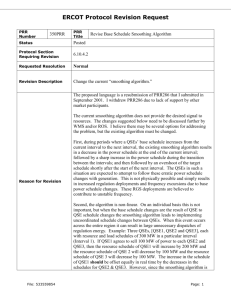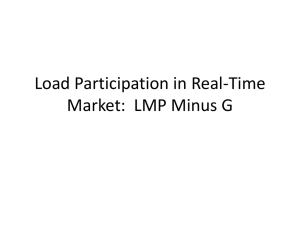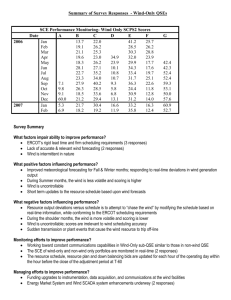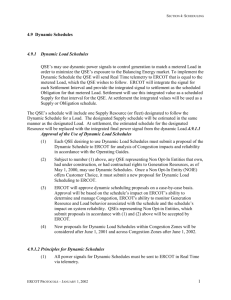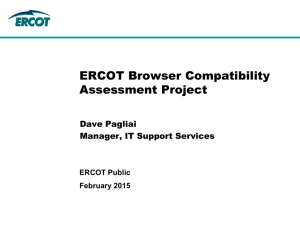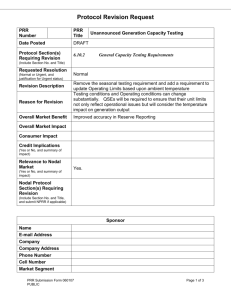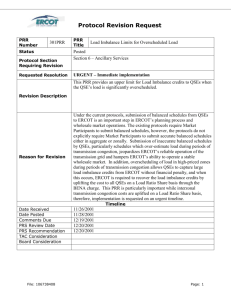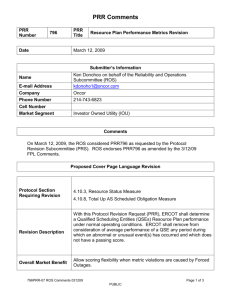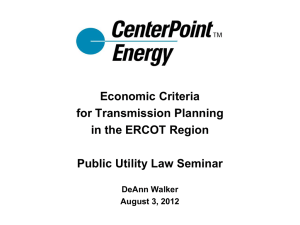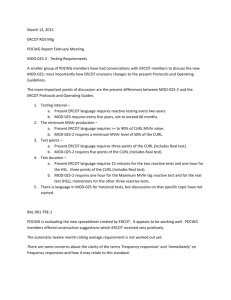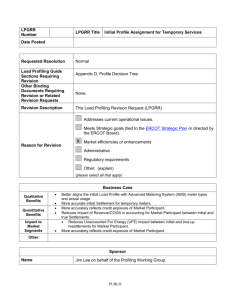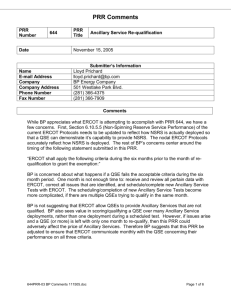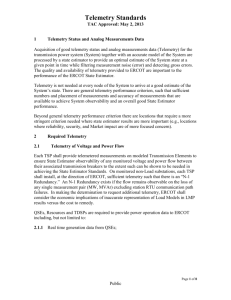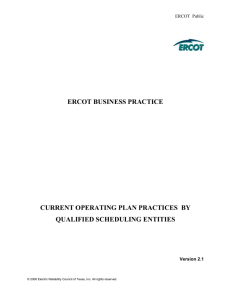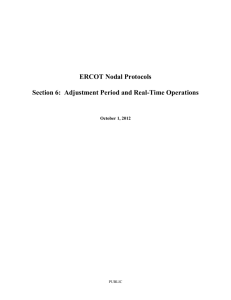Section 3.2.6 Duplicate Text
advertisement
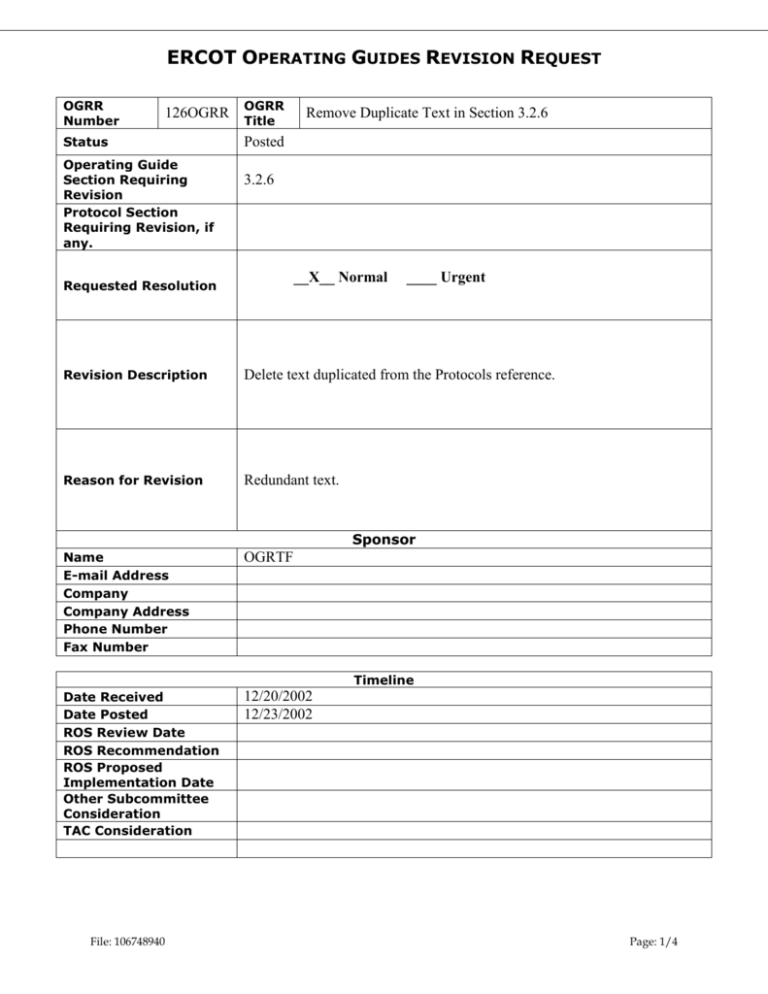
ERCOT OPERATING GUIDES REVISION REQUEST OGRR Number 126OGRR OGRR Status Operating Guide Section Requiring Revision Protocol Section Requiring Revision, if any. Title Remove Duplicate Text in Section 3.2.6 Posted 3.2.6 __X__ Normal Requested Resolution ____ Urgent Revision Description Delete text duplicated from the Protocols reference. Reason for Revision Redundant text. Sponsor Name E-mail Address Company Company Address Phone Number Fax Number OGRTF Date Received Date Posted ROS Review Date ROS Recommendation ROS Proposed Implementation Date Other Subcommittee Consideration TAC Consideration 12/20/2002 12/23/2002 Timeline File: 106748940 Page: 1/4 ERCOT OPERATING GUIDES REVISION REQUEST PROPOSED OPERATING GUIDE LANGUAGE REVISION 3.2.6 Dynamic Schedules REFERENCE: Protocols Sections , 4.9.1, 4.9.2 and 4.9.3 4.9.1 Dynamic Load Schedules QSE’s may use dynamic power signals to control generation to match a metered Load in order to minimize the QSE’s exposure to the Balancing Energy market. To implement the Dynamic Schedule the QSE will send Real Time telemetry to ERCOT that is equal to the metered Load, which the QSE wishes to follow. ERCOT will integrate the signal for each Settlement Interval and provide the integrated signal to settlement as the scheduled Obligation for that metered Load. Settlement will use this integrated value as a scheduled Supply for that interval for the QSE. At settlement the integrated values will be used as a Supply or Obligation schedule. The QSE’s schedule will include one Supply Resource (or fleet) designated to follow the Dynamic Schedule for a Load. The designated Supply schedule will be estimated in the same manner as the designated Load. At settlement, the estimated schedule for the designated Resource will be replaced with the integrated final power signal from the dynamic Load. 4.9.2 Approval of the Use of Dynamic Load Schedules (1) Each QSE desiring to use Dynamic Load Schedules must submit a proposal of the Dynamic Schedule to ERCOT for analysis of Congestion impacts and reliability in accordance with the Operating Guides. (2) Subject to number (1) above, any QSE representing Non Opt-In Entities that own, had under construction, or had contractual rights to Generation Resources, as of May 1, 2000, may use Dynamic Schedules. Once a Non Opt-In Entity (NOIE) offers Customer Choice, it must submit a new proposal for Dynamic Load Scheduling to ERCOT. (3) ERCOT will approve dynamic scheduling proposals on a case-by-case basis. Approval will be based on the schedule’s impact on ERCOT’s ability to determine and manage Congestion, ERCOT's ability to monitor Generation Resource and Load behavior associated with the schedule and the schedule’s impact on system reliability. QSEs representing Non Opt-in Entities, which submit proposals in accordance with (1) and (2) above will be accepted by ERCOT. (4) New proposals for Dynamic Load Schedules within Congestion Zones will be considered after June 1, 2001 and across Congestion Zones after June 1, 2002. File: 106748940 Page: 2/4 ERCOT OPERATING GUIDES REVISION REQUEST 4.9.3 Principles for Dynamic Schedules (1) All power signals for Dynamic Schedules must be sent to ERCOT in Real Time via telemetry. (2) Each Dynamic Load Schedule must be tied to a Load meter or group of Load meters. This includes Load that is calculated by subtracting interchange telemetry from actual generation telemetry, appropriately adjusted for T&D Losses. A Load or group of Loads that is/are dynamically scheduled can only be followed by Generation Resources represented by the same QSE as the Load. (3) Each Dynamic Load Schedule will indicate the dynamic power signal that will be used to create the final schedule. (4) Dynamic Load Schedules tied to Load meters (or groups of Load meters) may be used between Congestion Zones. (5) A QSE using Dynamic Load Schedules shall send a dynamic power signal or signals to ERCOT. (6) Each QSE with a Dynamic Load Schedule will include in its schedules and plans submitted to ERCOT, an estimate for the integration of the schedule for each Settlement Interval. These schedule integration estimates will be used for allocation of RPRS costs. (7) ERCOT will integrate the dynamic power signal sent by a QSE for each Settlement Interval. This integrated signal shall replace the estimate and will be used in settlement as the final schedule. Dynamic Schedules do not alter the settlement process for metered Loads. (8) If a signal is lost for any reason, ERCOT will use the final schedule for Settlement purposes. (9) ERCOT will use the dynamic power signal in each of the applicable QSE’s SCE equation. Other TAC Subcommittee Review PRS Review Date PRS Protocols Impact Decision WMS Review Date RMS Review Date File: 106748940 Page: 3/4 ERCOT OPERATING GUIDES REVISION REQUEST TAC Action TAC Vote Date TAC Proposed Implementation Date TAC Vote Results File: 106748940 Page: 4/4
